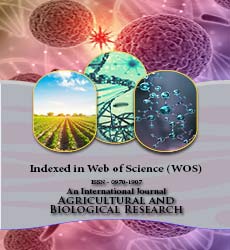Agricultural and Biological Research
RNI # 24/103/2012-R1
U Muthuvel, K Suresh*
Butter beans (Phaseolus lunatus L.) are a high-protein food grown in the Kodai Hills and belong to the Fabaceae family. For phosphorus deficiency, the soil is usually adequately treated with phosphatic chemical fertilisers. Butter bean crop production is poor due to insufficient fertilization. The widespread use of artificial fertilisers would devastate the ecosystem, and farmers have complained that the price is too high. As a result, it is critical to limit the usage of chemical fertilisers in favour of organic fertilisers derived from microbial biomes such as Phosphate-Solubilizing Bacteria (PSB). The experiment consisted of 15 treatments with phosphate solubilizing bacteria with three levels (control, tricalcium phosphate, and PSB) in a randomised complete block design with three replications in order to examine the influence of PSB on butter bean growth, yield, and metabolic characteristics. The administration of PSB to the butter bean crop resulted in improved growth, yield, and metabolic parameters, resulting in higher seed output and a possible crop yield increase, according to this study.
